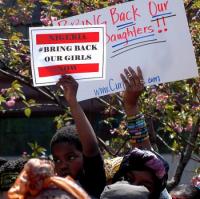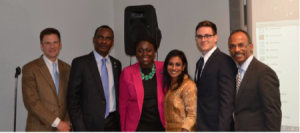Bring Back Our Girls!
 The kidnapping of 278 schoolgirls is one of the most recent in a series of attacks by Boko Haram, a militant Islamic Group from Nigeria's north. Attacks from the group have steadily increased since it began an insurgency five years ago; 1,500 are said to have died this year alone. With no end to the assaults in sight, what does the peace and conflict field have to offer as solutions? Communities Without Boundaries International, Inc. organized an international panel of peace and conflict experts to discuss this and other questions on Tuesday, May 13th 2014 at the School for Conflict Analysis and Resolution at George Mason University. A number of academics, civil society members, Nigerian Diaspora members, students of peace and conflict, and well-wishers attended the event. In addition, several people from across Africa, the United States, and the Balkans viewed and participated in the discussion via Google livestream.
The kidnapping of 278 schoolgirls is one of the most recent in a series of attacks by Boko Haram, a militant Islamic Group from Nigeria's north. Attacks from the group have steadily increased since it began an insurgency five years ago; 1,500 are said to have died this year alone. With no end to the assaults in sight, what does the peace and conflict field have to offer as solutions? Communities Without Boundaries International, Inc. organized an international panel of peace and conflict experts to discuss this and other questions on Tuesday, May 13th 2014 at the School for Conflict Analysis and Resolution at George Mason University. A number of academics, civil society members, Nigerian Diaspora members, students of peace and conflict, and well-wishers attended the event. In addition, several people from across Africa, the United States, and the Balkans viewed and participated in the discussion via Google livestream.
The symposium, moderated by Johnny J. Mack, President of CWBI, included practitioners, academics/scholars, and civil society members, both live in the United States and via Skype from Nigeria. These included Chom Bagu, Country Director, Search For Common Ground; Sani Muazu,President, Motion Picture Association of Nigeria; Dr. Sylvester Okere, Continentail African Leadership Council; Christopher O’Connor, National Endowment for Democracy; Professor Carl Levan, American University in Washington, DC and Dr. Maneshka Eliatamby, Program Director, Communities Without Boundaries International, Inc. The panel took both micro and macro views of the issues that they see as currently plaguing Nigeria, leading to the kidnapping of the girls from the Chubok School in Borno State.
The panel took both micro and macro views of the issues that they see as currently plaguing Nigeria, leading to the kidnapping of the girls from the Chubok School in Borno State.
In summary, the panel identified the following as major issues facing the country:
1. International and government attention has been limited to the issue of the abducted girls, ignoring other critical factors associated with the conflict;
2. Lack of a comprehensive understanding of the situation on the ground that is depictive of the complexities of Nigeria, including its multi-ethnic and religious backgrounds;
3. Lack of understanding of Boko Haram and its movement, birth, evolution, leadership, and membership;
4. Lack of educational and economic opportunity in the north and northeast of the country even if one is employable, leading to disgruntled populations, especially youth, and recruiting opportunity for Boko Haram;
5. Lack of opportunity for youth, of youth empowerment and their participation in civil society;
6. Lack of opportunity for Nigerian people to voice their grievances and issues and to be heard by governance structures;
7. Lack of opportunity for the girl child, including educational opportunity, especially in the north and north east of the country;
8. Lack of robust civil society that is representative of the country’s diverse populations;
9. Lack of accountability of government and non-state actors alike to civil society;
10. Lack of collaboration between the government and opposition parties, which contributes to instability of political structures, especially in the northeastern states of Borno and Adamawa;
11. Consistently slow government response to issues, including violence and abduction of girls;
12. Lack of culture that values life in Nigeria; and
13. Nigerian military history of human rights violations.
Recommendations & Next Steps:
1. The government and international community must recognize that the abduction of girls is one among a list of issues that Nigeria and its people are facing;
2. Develop comprehensive understanding of the situation on the ground that is depictive of realities, including the multi- ethnic and religious nature of the country;
3. Study and establish better understanding of the birth, evolution, leadership and membership of Boko Haram;
4. Establish robust educational and economic opportunities in north and northeast;
5. Recognition of youths’ role in achieving peace and sustainable development, and establishment of structures that enable youth participation and voice in civic activity at local and federal levels;
6. Establishment of structures that enable people of Nigeria to voice their concerns and needs to civil society and government structures;
7. Need to establish viable educational and economic empowerment opportunities for girls and women, especially in north and northeast;
8. Build a diverse and robust civil society responsive to whole population that is supported by international organizations;
9. Empower civil society to hold government and non-state actors accountable;
10. Foster collaboration between President Goodluck Jonathan’s government and opposition parties;
11. Faster and more effective government response to issues such as abduction of girls and various forms of violence, including poverty;
12. Move from a traditional security paradigm to a human security paradigm and create culture that values life. This would include establishing human rights, conflict resolution, peace and nonviolence education curriculum for communities, civil society, and government; and
13. Establish human rights, conflict resolution, peace and nonviolence education curriculum for Nigerian military.
CWBI’s peacebuilding and sustainable development program in Nigeria include the following projects:
1. Nonviolence, conflict resolution, peace and sustainable education for Nigerian youth and girls in partnership with Chom Bagu of Search for Common Ground-Nigeria and Sani Mu’Azu will work together;
2. Youth Without Boundaries program carried out in collaboration the African University of Science and Technology in Abuja;
a. Provides nonviolence, conflict resolution, peace and sustainable education to Africa’s leading engineering students;
b. Chika Education and Development Project developed and carried out at Chika Village in Galadimawa, Abuja;
3. Working with the Nigerian government to establish inter-continental mentorship program;
4. Working to establish a robust civil society: CWBI and its partners in Abuja, Kano, Kaduna, Jos and other north and northeastern states of Nigeria will work to engage local partners and help establish a robust civil society; and
5. Develop peacebuilding and economic development partnerships between Nigerian Diaspora leaders and local Nigerian communities.



